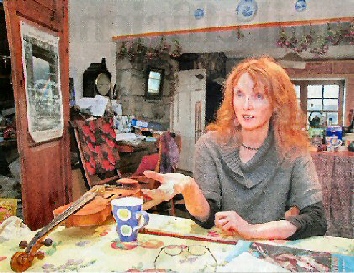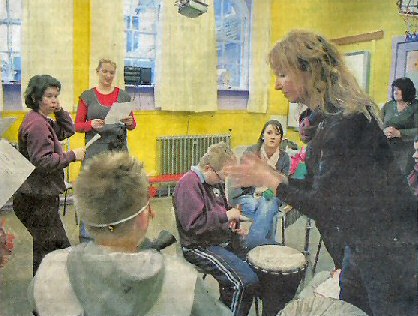Exploring joys of music with the Alpha factor
from the ROSS-SHIRE JOURNAL, January 4, 2008
 ALPHA MUNRO is a musician who was born in London and educated in West Sussex. She is married to Hector Munro and lives near Evanton where they have raised three children. As well as being active in Fèis Rois, Alpha has spent 23 years of her working life using music as a tool to connect and communicate with less-able children. Here she speaks to MIKE HERD about a life devoted to music — and the power she believes it has to touch people's lives.
ALPHA MUNRO is a musician who was born in London and educated in West Sussex. She is married to Hector Munro and lives near Evanton where they have raised three children. As well as being active in Fèis Rois, Alpha has spent 23 years of her working life using music as a tool to connect and communicate with less-able children. Here she speaks to MIKE HERD about a life devoted to music — and the power she believes it has to touch people's lives.
How did you get the name Alpha?
I have a twin sister and when I was born my mother had no idea she was going to have twin daughters and she hadn't prepared names for us and so the nurses nicknamed me Alpha because I was born first and my sister Beta.
How did you gravitate to Ross-shire?
I was born in London but I have many cousins living in the Highlands who I visited on holiday many times and then of course I met Hector and I've been here thirty-two years!
What was it that sparked off your interest in music?
I won a cup for music at school. That was very exciting so I felt a bond with music. I had a wonderful violin teacher who was very encouraging. She said, "I can see you in an orchestra" but as a youngster the thought of playing in an orchestra wearing black for the rest of my life filled me with horror. The irony of it is that very often now I do wear black and I do play and perform with a group for ceilidhs.
How many instruments do you play?
Fiddle is my main instrument. I also play some piano and guitar but I couldn't call myself a guitarist. I use it as accompaniment with the children so that I can face them. When you are playing the piano you mostly have your back to them.
Are your family musical?
Yes they are all musical. My daughter Isabella plays flute and piano. My daughter Eileen is just a beginner on pipes. She also plays tin whistle and piano and she is now doing guitar and my son Fiannian has a lovely singing voice. Hector, my husband is a fund of traditional songs.
How long have you worked with special schools?
I've worked with St. Clements and St. Duthus on a regular basis, St Clements for the last 22 years.
I went there for one workshop and they asked me whether I would like to come back so I worked on a voluntary basis for a number of years and then I was invited to St. Duthus and so it continued.
I think music for the disabled in the old days was quite a rigid process and I came in with ideas of free expression and that seemed to work. I attended a course in music therapy in London which was an absolute inspiration and through my work with the Scottish Playgroups I accumulated a small basket of instruments. When I started, the Scottish Down Syndrome Association helped me to buy instruments so suddenly I was working with large instruments like symbols and base drums to help the children move and coordinate. There was money for unusual instruments that the children had never used before and it was exciting to watch them progress in different ways. I still sing the same songs that I learnt in the old days with the children.
How do you feel when you first begin communicating with a child through music?
Music is a tool for communication and I get very excited when children progress. For instance when one member of staff tells me that a child hasn't reacted in that particular way before or has said something they don't usually say or they moved in a particular way that they haven't done before that gives me a kick. I work on creativity, communication and co-ordination and I try in every session to communicate with each child individually. There is a moment when you are improvising while working with these children when you feel you have created a personal dynamic between you. Then you know you have that child in your hands and you can move them in a certain direction. That's very exciting. So with music you can communicate instrumentally with them and even those with severe sensory deprivations. Sound is one of the first senses to be developed in the womb with the ear developing in the womb first. Sound continues development through communication so we have tonal responses from the outset and of course in learning to speak we use sound.
Children are individuals with a wide range of abilities, how do you cope with that?
The way it affects the profoundly disabled varies. A fiddle has been very successful for me but then some children find that the high frequencies can be irritating. I found that 'surprisingly enough' autistic children are very responsive to fiddle. Some children respond more to the chordal sounds of pianos. Some respond more to the low frequencies of drums for instance. So you are always experimenting with different sounds to see how the individual child responds best. Tiny children may respond to high sounds or tinkling sounds of chimes. They speak in high voices as they respond to higher sounds. Mothers talk to their children in higher voices and so small children tend to respond to them similarly, so I use that. I've had children becoming mesmerised with fiddle music and this has helped children go to bed so that parents who appreciate the sound of the violin may use fiddle music to put their children to sleep.
 Have any children gone on to play musical instruments?
Have any children gone on to play musical instruments?
Yes, I had a blind girl a long time ago who I taught recorder to and for a while she used to play recorder at ceilidhs and sing. I've worked with Aspergers children who have taken up fiddle playing.
Watching you play while you teach a class seems to me to be physically very demanding. Where do you get your energy from?
I think in order to create response you have to be incredible focused and I think that one's energy is focused for a snap shot in time and the fact that you love what you are doing and you know that in order to evoke a response that intention has to be strong and you just go with the flow.
Tell me about your role with Fèis Rois?
Fèis Ross has been an inspiration to me. I began teaching through Fèis Rois when Fèis Rois set up one of the first community classes in this area in Evanton around 89/90. And from the group I created a performing group and my initial project was to make it a local community group and within a few years once the children had established their short sets of tunes we played for the youth club for the Church for a local wedding, for the gala and in the school. The demand widened and we started playing for ceilidhs outside the village for festivals, across the Highlands. We were invited to play in Ireland, Brittany, Wales and also at the Edinburgh Fiddle Fest weekends.
How young do the children start learning?
I taught a beginner's class for Fèis Rois in this kitchen for a number of years and the whole ethos of teaching in the kitchen is about heart and soul and part of everyday life which I like to think music is all about. Music underpins so many ritualistic events in the community. It's important that it starts by the hearth and in the home. The children usually start learning from about eight or nine but I also teach privately children as young as four. Their ability to learn depends on their coordination and their focus and concentration and their talent. I found that those young children start by ear and have a very natural playing response.
You have a wonderful CD called "Stars in the Wave" are you planning another?
Yes I have only the one CD. I'd like to do another but I just don't have the time.
Alpha, pictured here in her kitchen, has devoted much of her life to harnessing the power of music.

Alpha is passionate about all that is positive about music with the children she teaches.
